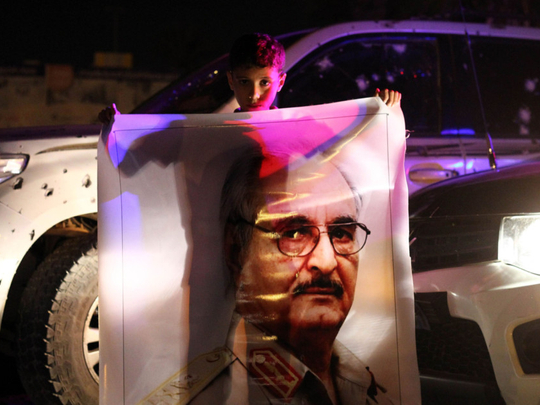
Benghazi: Libya’s internationally recognised government on Monday rejected a UN proposal for a power-sharing arrangement with rival Islamist-led authorities that was intended to bring peace to the north African nation.
The internationally recognised parliament will not sign the agreement to form a unity government because the UN refused to exclude amendments added by the Islamist authorities without its consent, government spokesman Farraj Abu Hashem said.
Libya slid into chaos after the 2011 toppling and killing of long-time dictator Muammar Gaddafi. The internationally recognised government is based in the far eastern town of Tobruk, while a rival Islamist-led government is based in the capital, Tripoli.
The special UN envoy for Libya, Bernardino Leon, announced the proposal along with a list of candidates to head the new body on October 8.
UN deputy spokesman Farhan Haq said Leon has made clear “that this is the final text”.
“We are not reopening the text and our hope remains that all sides will agree to the text for the good of the people of Libya,” Haq said.
The amendments that angered the Tobruk lawmakers would have given the unity government the power to fire all senior Libyan officials not unanimously approved by its members. The Tobruk government saw this as an attempt to remove their fiercely anti-Islamist army chief, General Khalifa Haftar, whose forces have been battling Islamist militias nationwide for over a year, government spokesman Ali Tekbali said.
The Islamist-led government did not officially reject the deal, but said “signing it would lead to further complications” in a statement issued Monday.
The Tripoli government objects to the deal because it does not provide sufficient guarantees that Islamic law will be implemented, members of the Islamist parliament said.
Both governments have slammed Leon for announcing candidates for the unity government when they had not agreed on forming one yet.
Meanwhile in Benghazi, Libya’s second largest city and the birthplace of the 2011 uprising, a mortar round an Islamist militia fired killed four children and an elderly man, medical officials said. The children were playing soccer in a Haftar-controlled area of the southern district of Al Laithi when the shell struck them, they added.
There were no obvious military targets near the site of the attack, several Benghazi residents said. They suggested the shell was fired to commemorate a recent killing of a senior Islamist fighter.
All officials and residents spoke on condition of anonymity because they are not authorized to brief reporters or fear reprisals.












